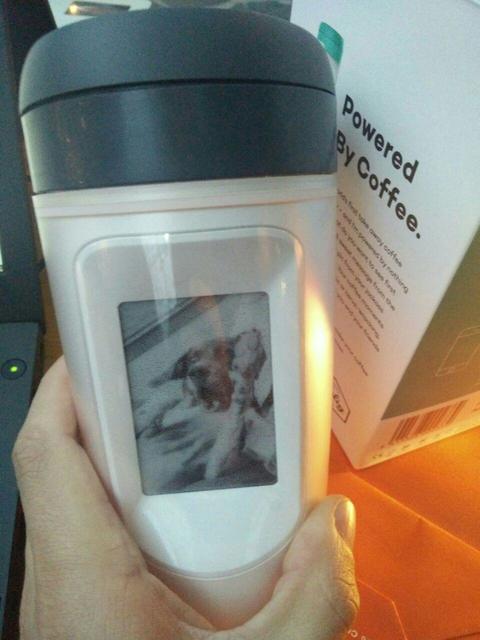Last weekend I attended Junction together with Khaled. It was tons of fun and I had a great time, but we ended up with absolutely nothing to show for it. Except for a neat shirt of course. Normally we’re constantly bouncing the silliest ideas off each other, so how come we produced nada for this particular hackathon? Below are the reasons I managed to come up with.

Most productive moment of the weekend: A picture of my dog on a coffee cup with e-ink display
1. Winning criteria are not project requirements
Although we initially had some ideas on what we wanted to create before the event started, we disregarded all of those just before it started as we felt that none were very interesting from a marketability perspective, which is what most of the companies hosting the various tracks were after. This was our first mistake. We completely boxed ourselves in by having the idea that our projects would have to be somehow relevant to the track’s host company. Who cares about their incentives? We’re here to have fun with their technology, not to solve their problems. Next time we won’t treat the criteria as if they’re the M in MoSCoW. They’re more like should haves for sure :)
2. Just pick a damn track
While hackathons I attended in the past all had one (maybe two) tracks, Junction had more tracks than I could count on my fingers. Of course this is neat, but at the same time it caused us to jump from track to track with our ideas, never arriving to the point where we actually started doing something. Usually, when we’re completely out of ideas for a track, there is no option but to do our own thing (ignoring the challenge altogether). This usually leads to fun results. At Junction however, every time we found that we couldn’t come up with something fun for the track we were currently looking at, we decided to go for a different track. This happened 10 times or something. Not productive! Next time I see this happening, I’m just going to pick a track and stick with it, possibly incorporating other tracks into the project as we go.
3. A PoC is all you need
Yeah. This is so obvious it shouldn’t even be listed here right? Well, it turns out we were actually focussing on creating working projects because.. I don’t know honestly. Maybe because we are used to jumping into the design of systems that are actually functional right away. And, at previous hackathons we did create functional pieces of soft/hardware. We managed to forget about only needing a PoC, and that having the underlying program logic work flawlessly is merely a bonus.
So, there you have it. There are probably a whole bunch of other reasons I didn’t manage to come up with, but at least I’ll be keeping these in mind for Junction 2017. Viva la reflection!